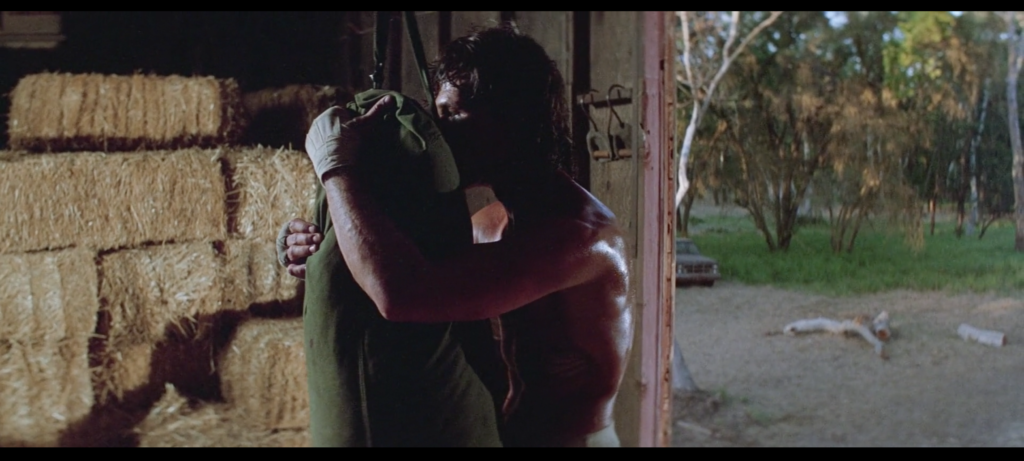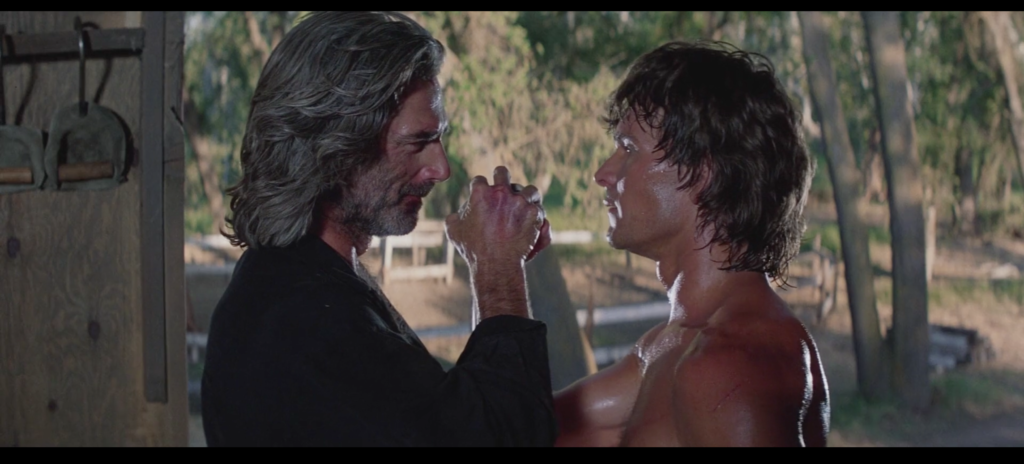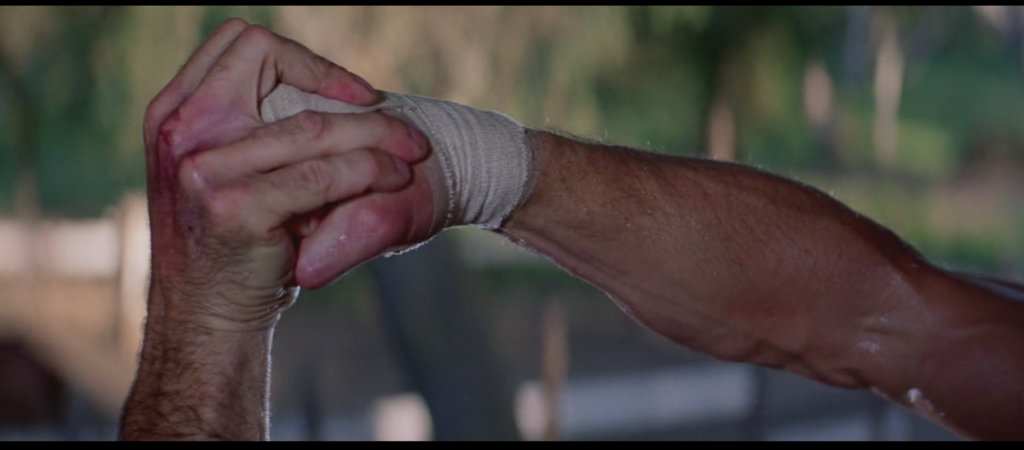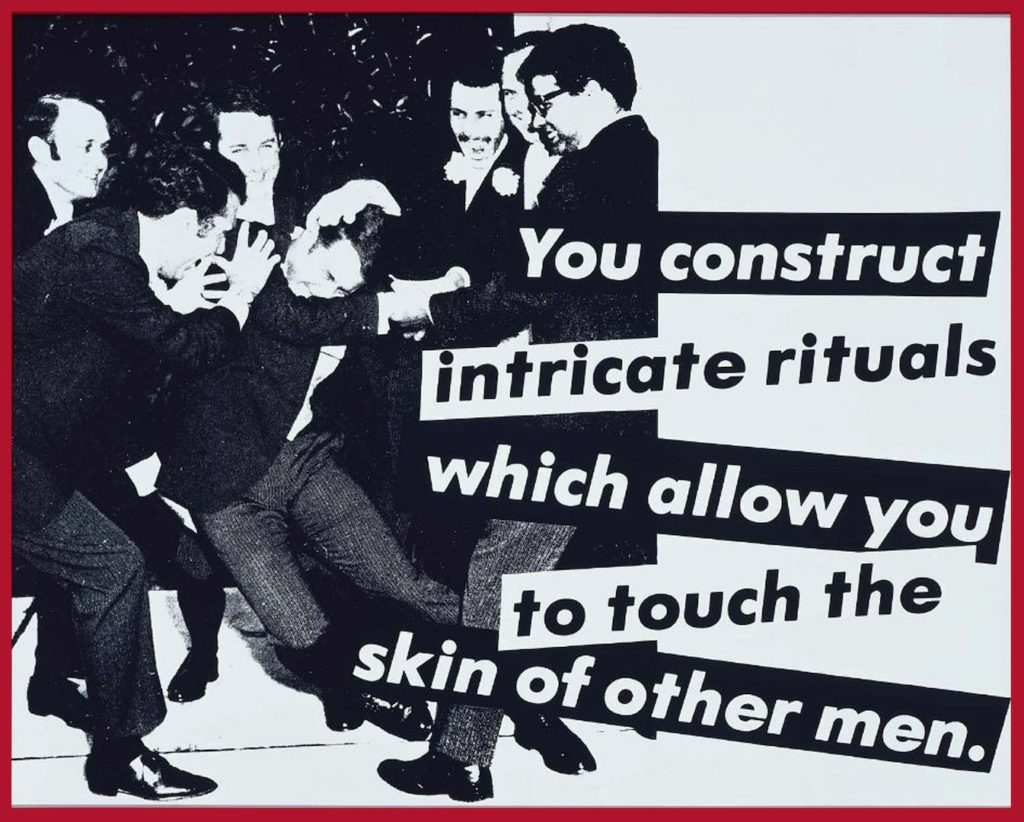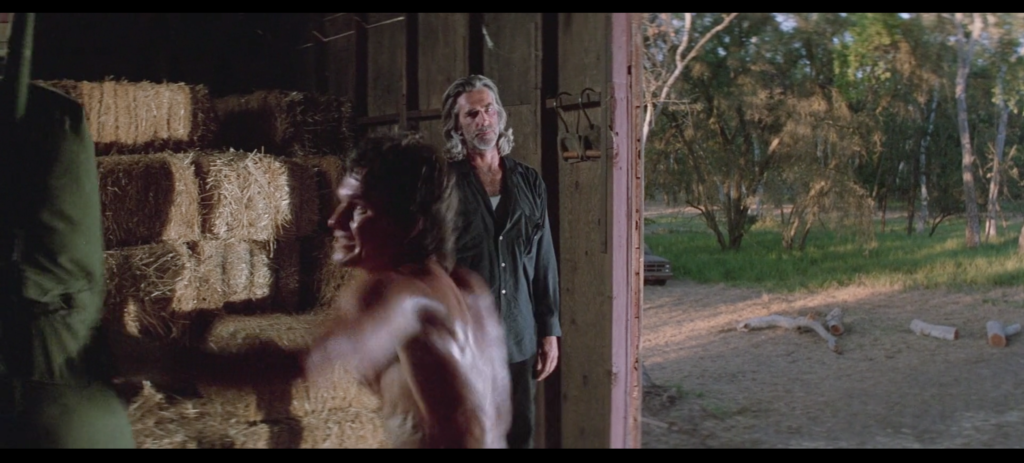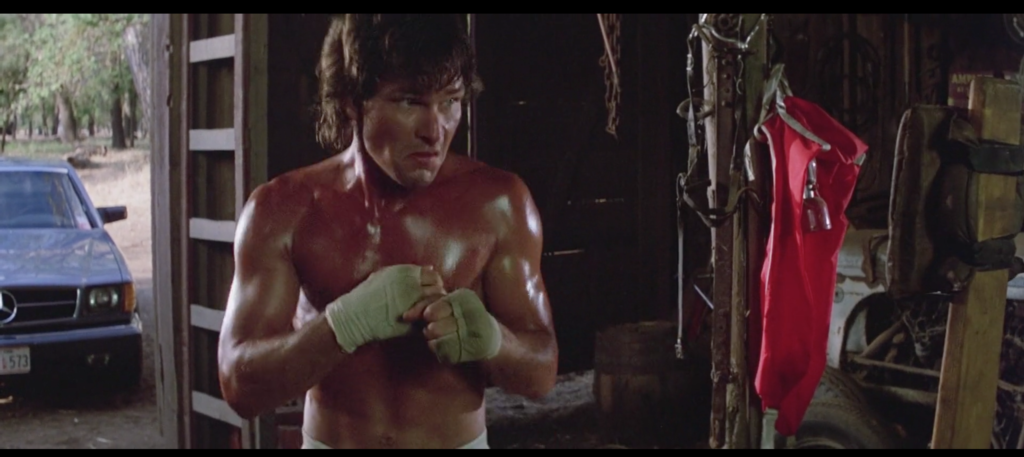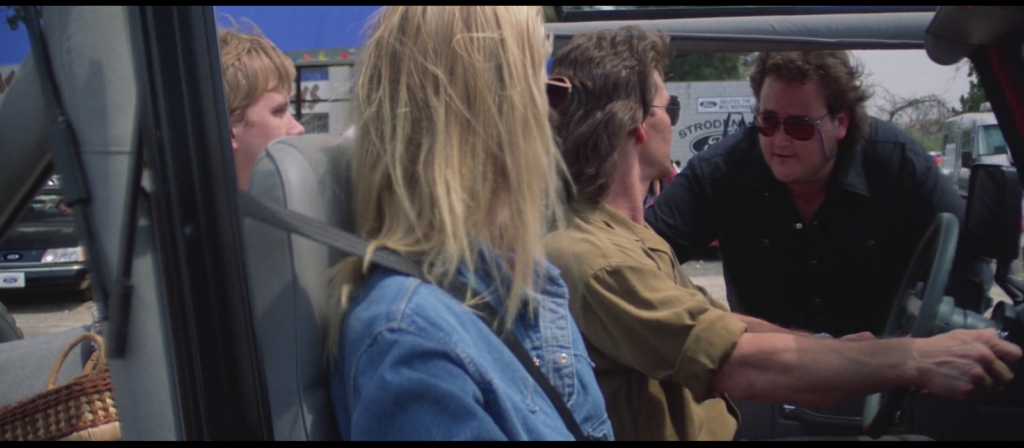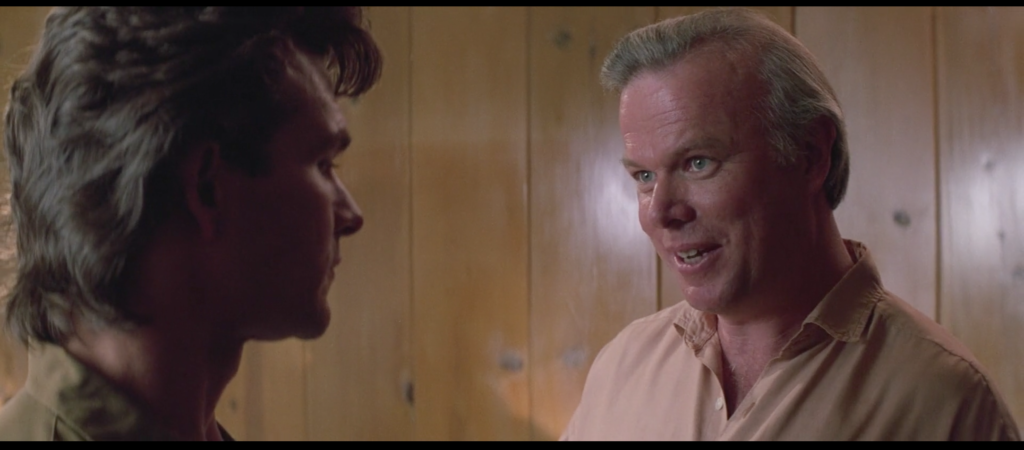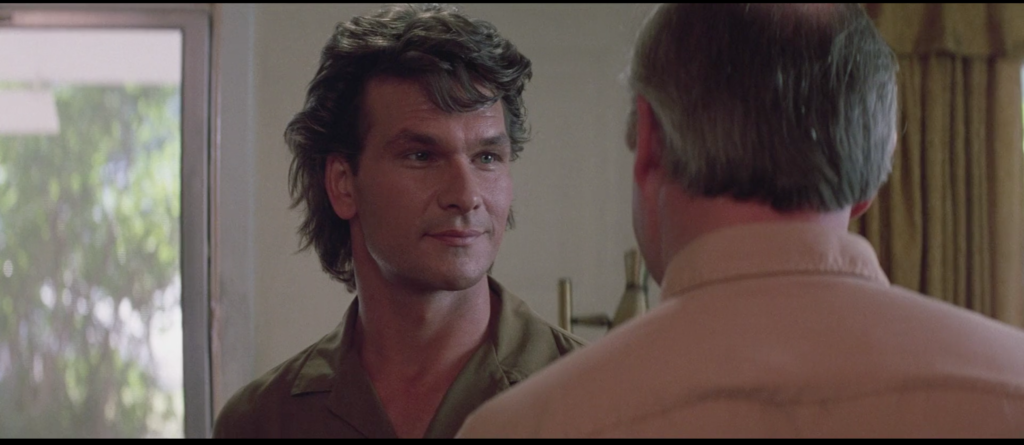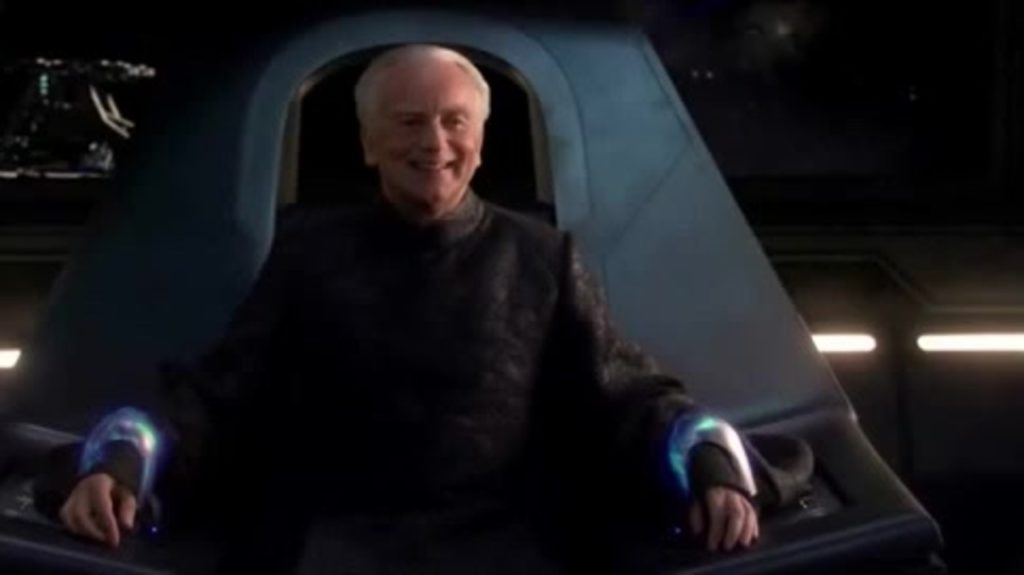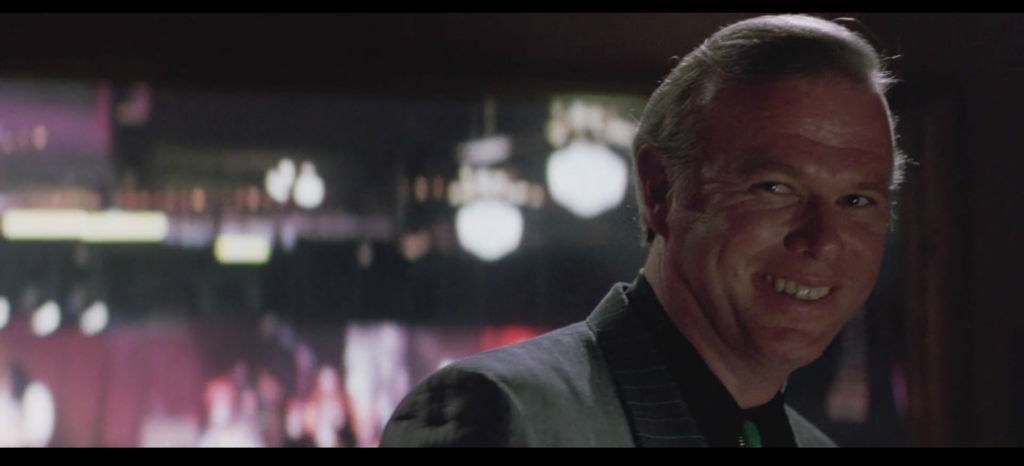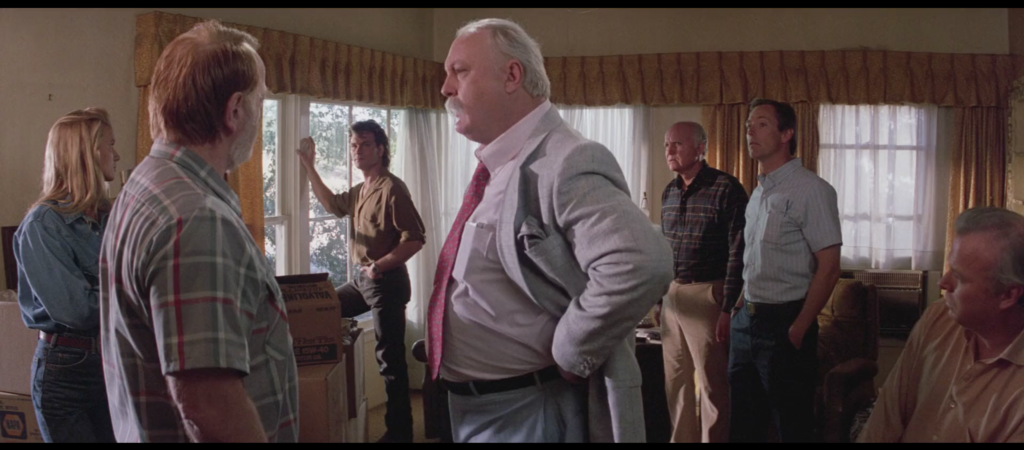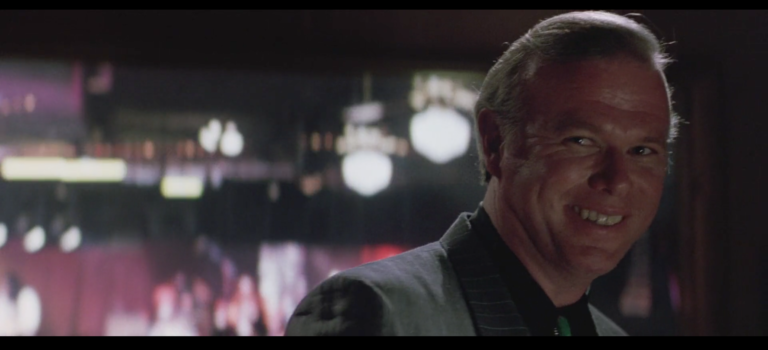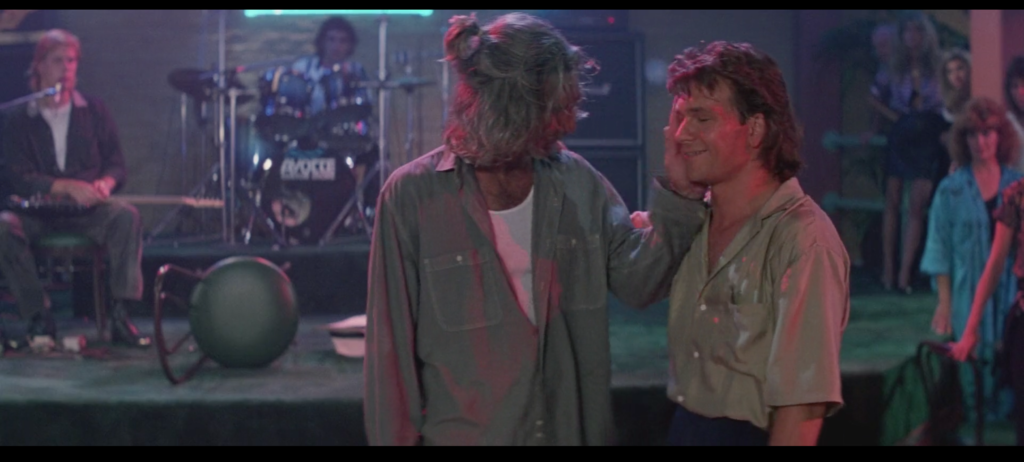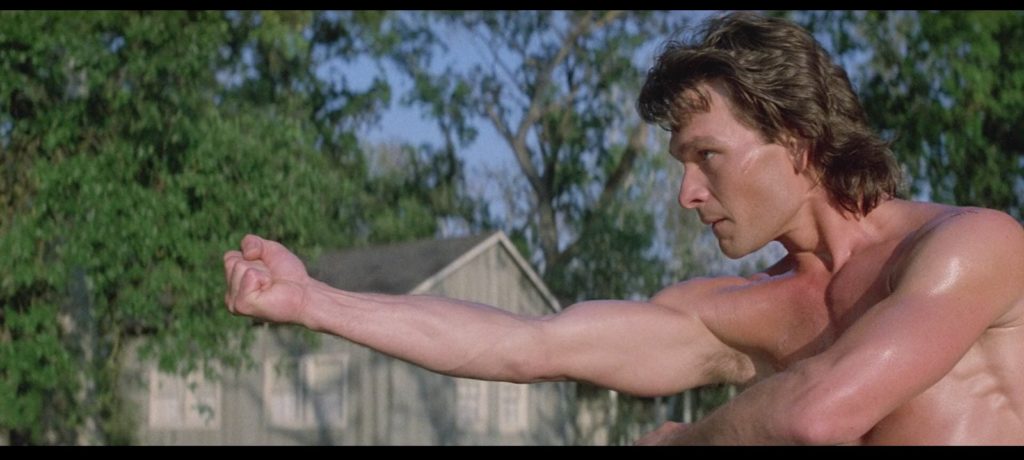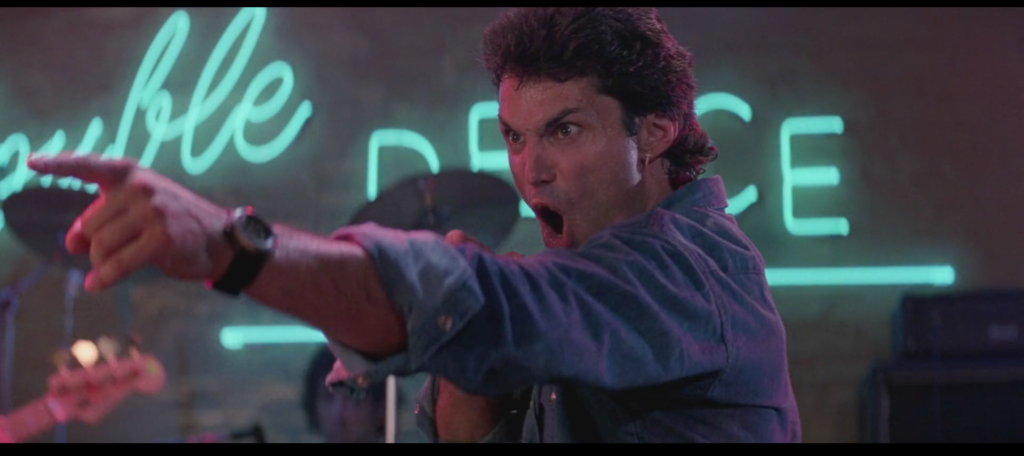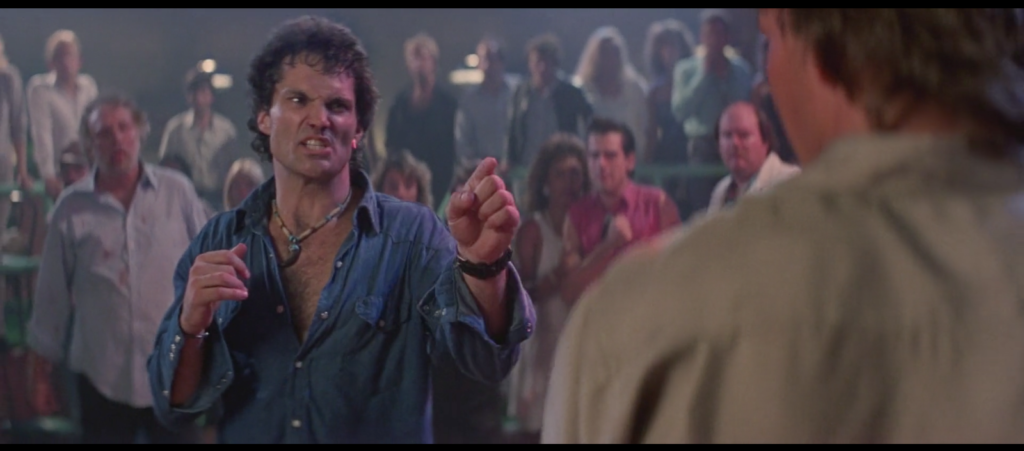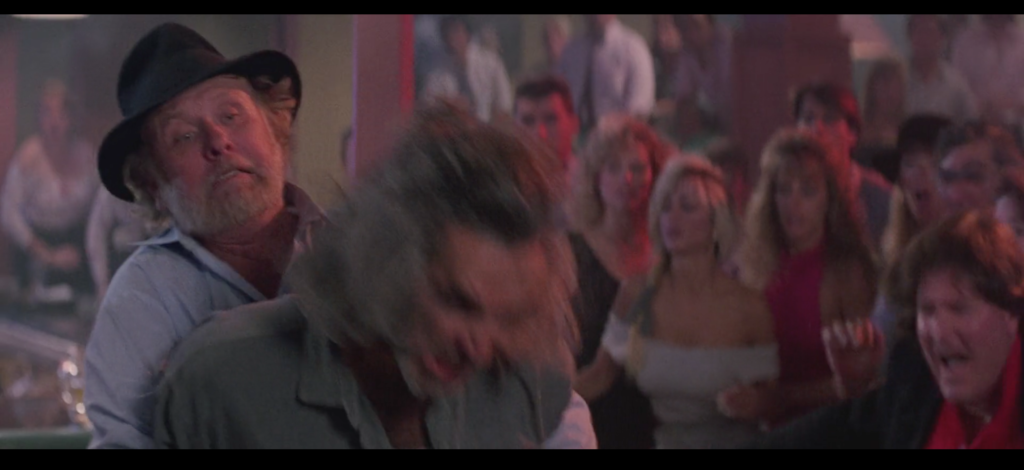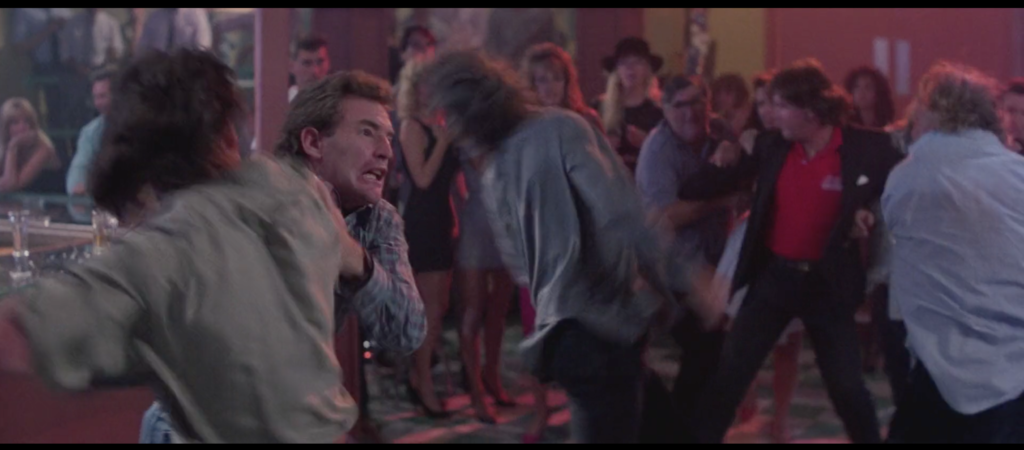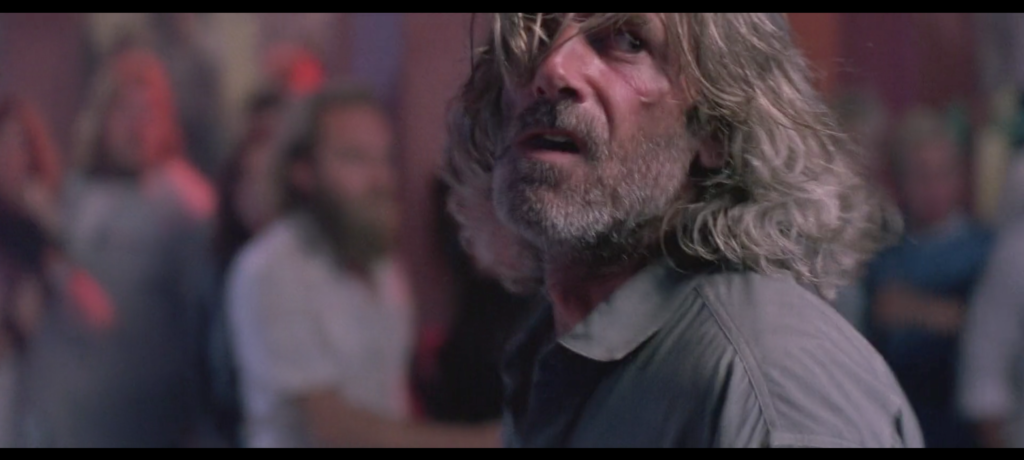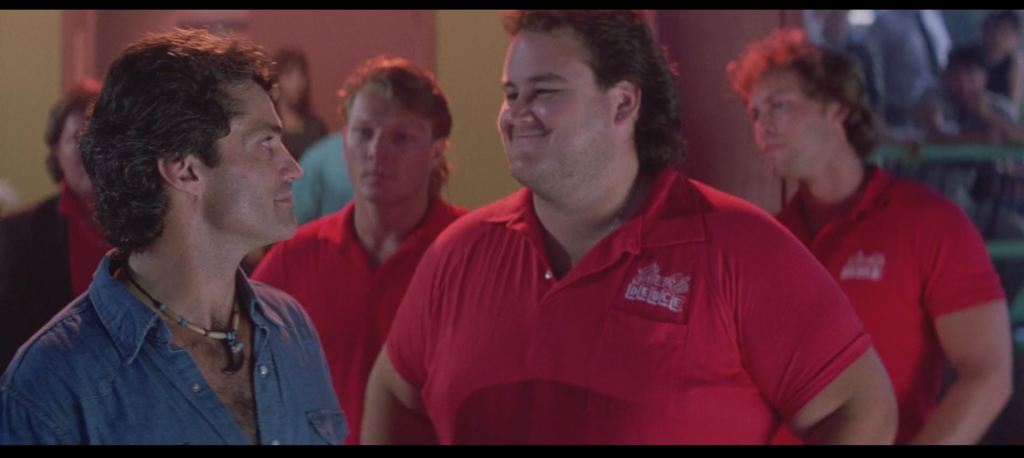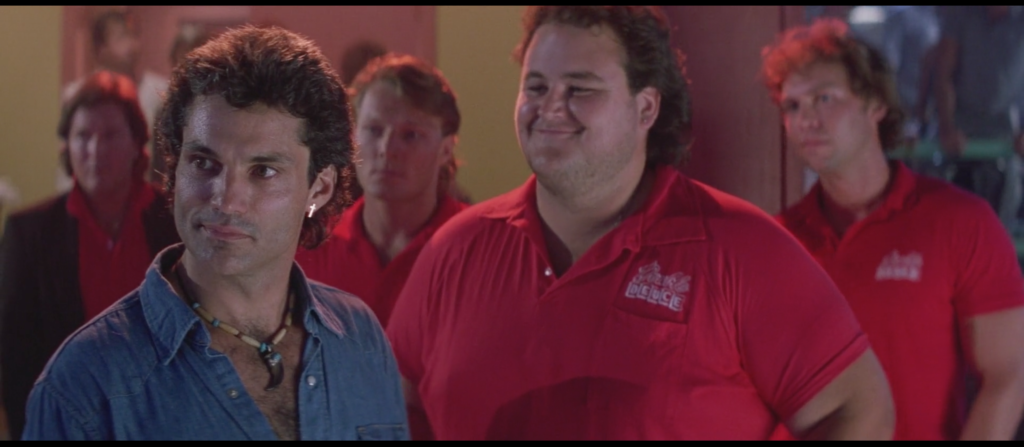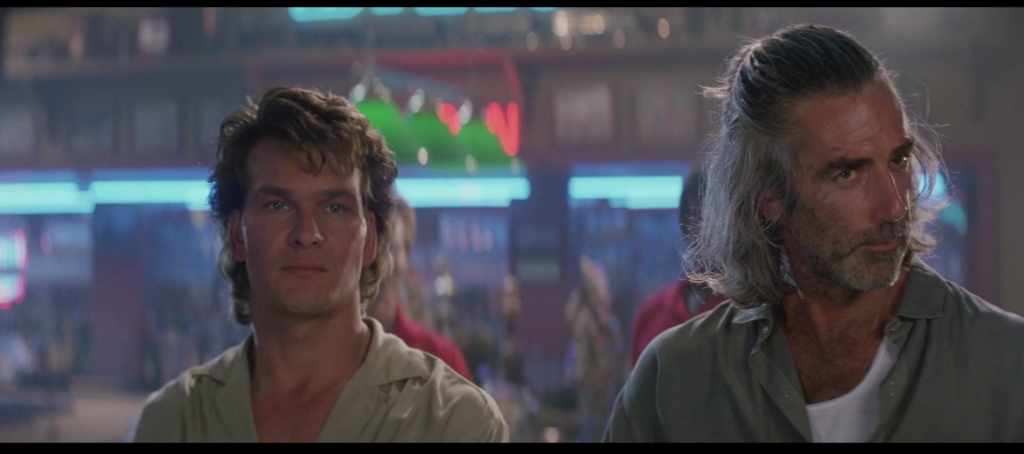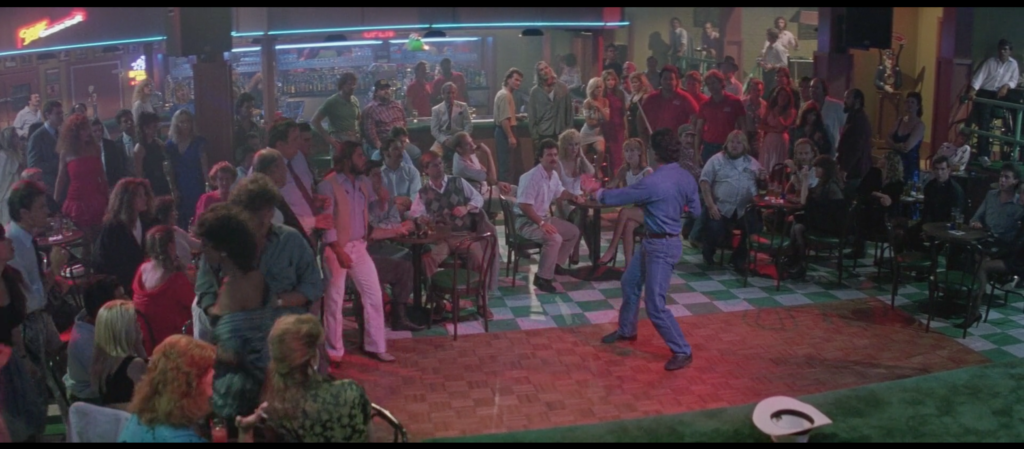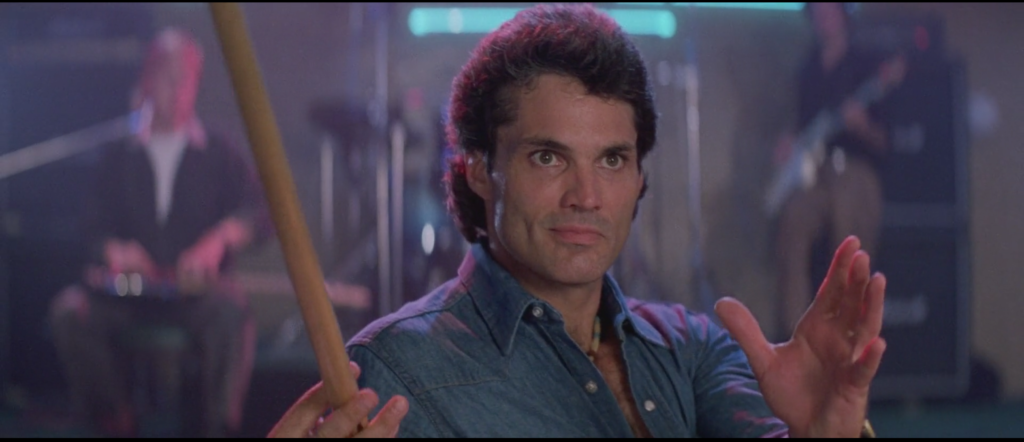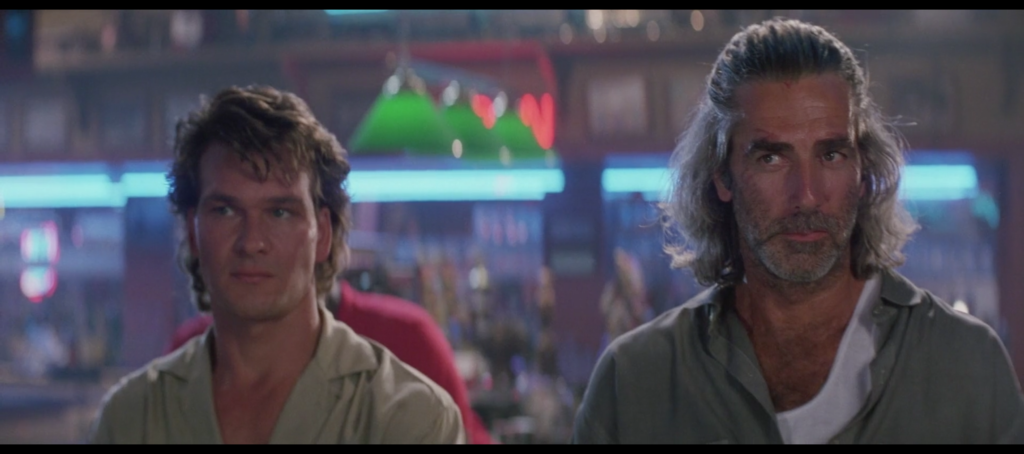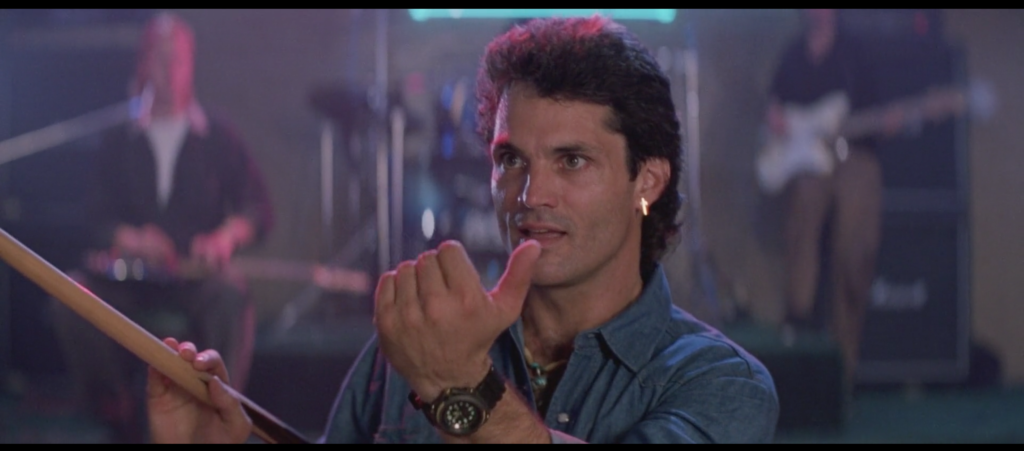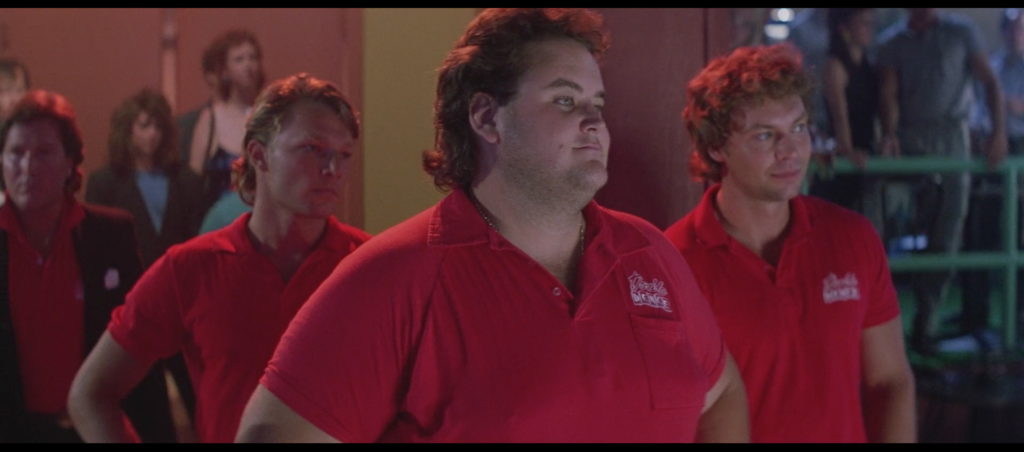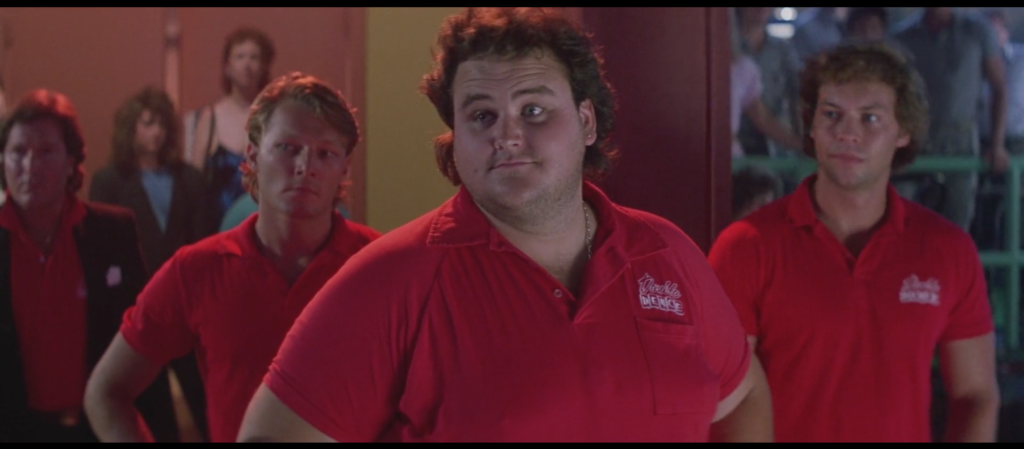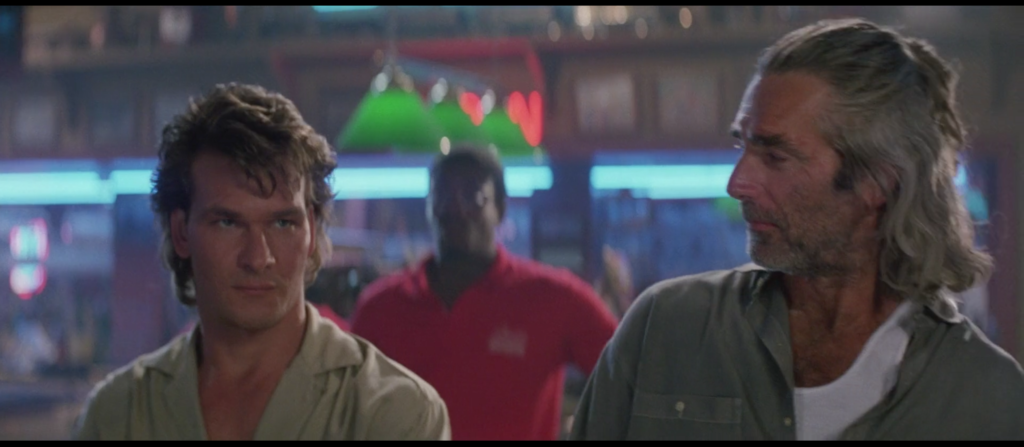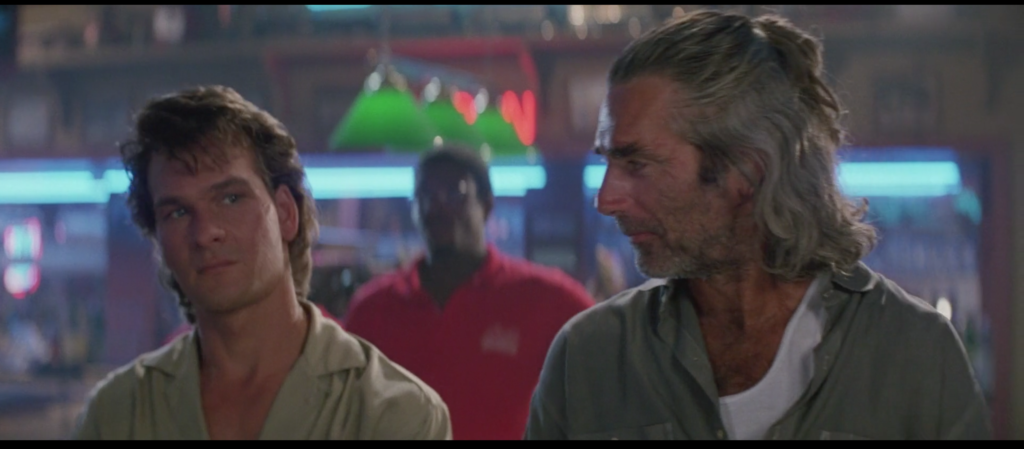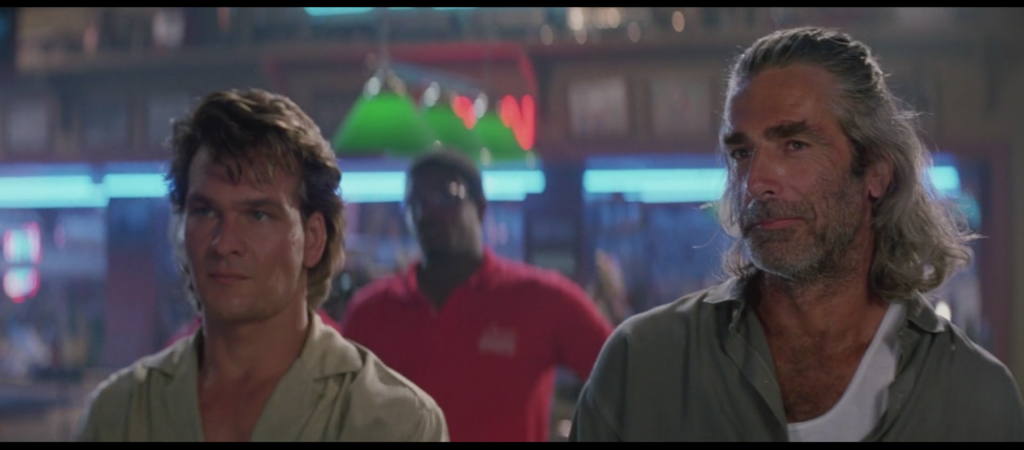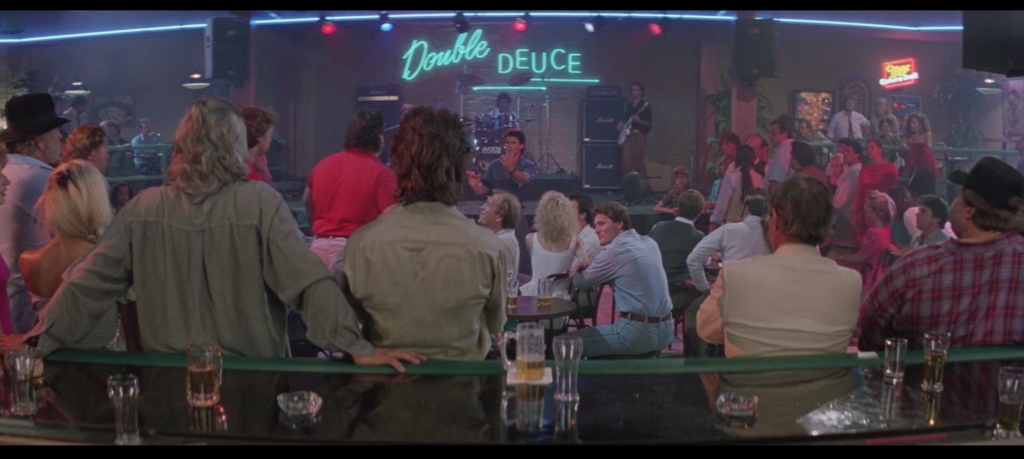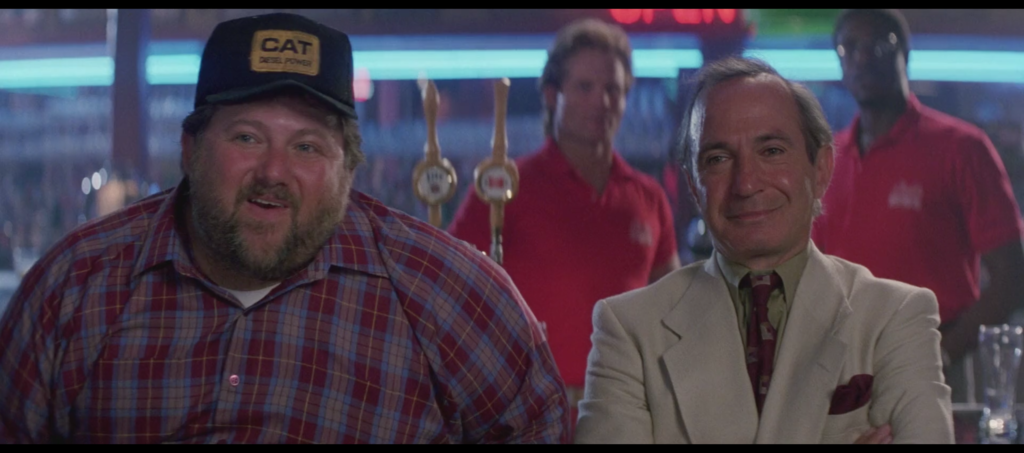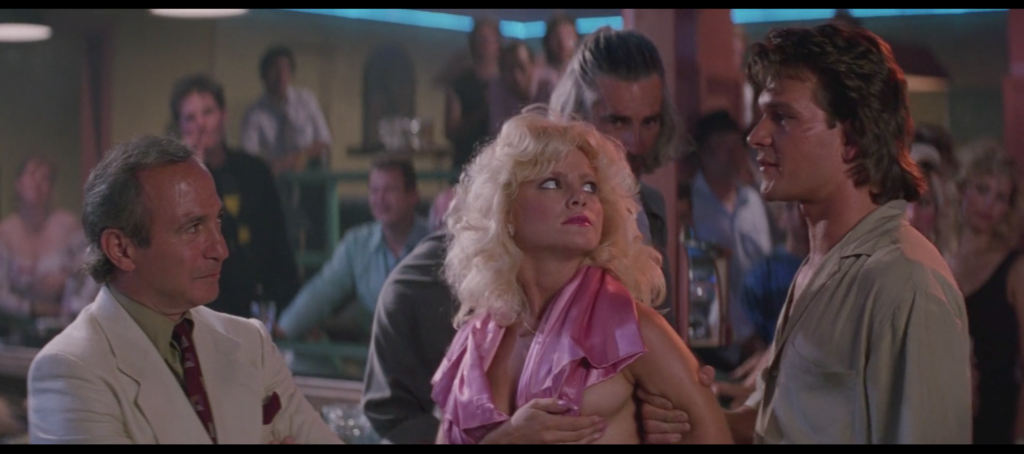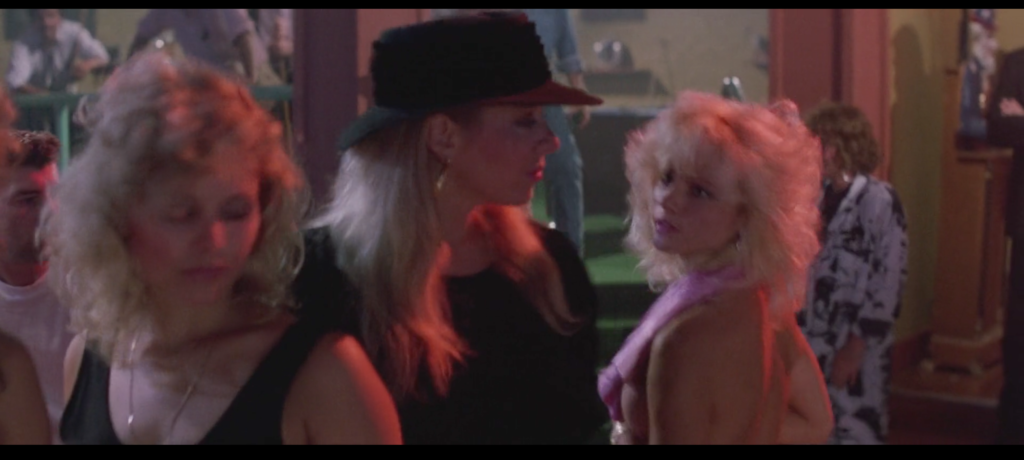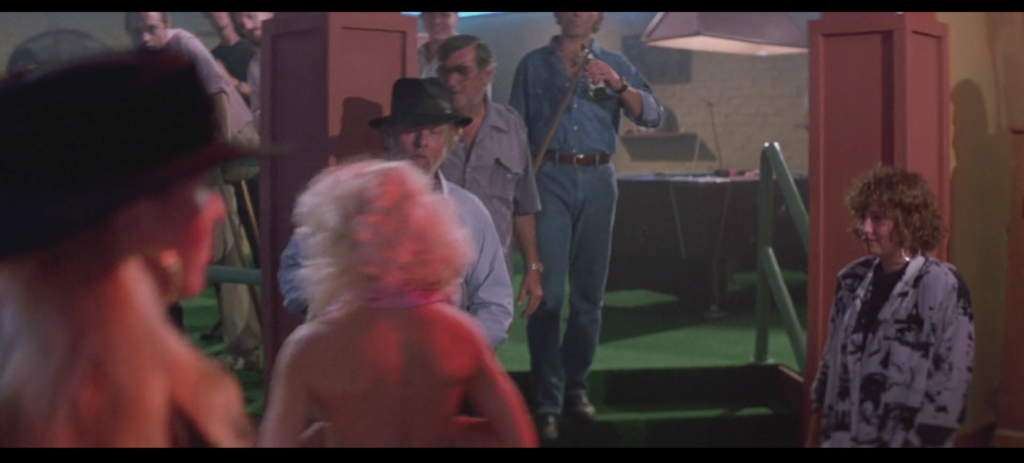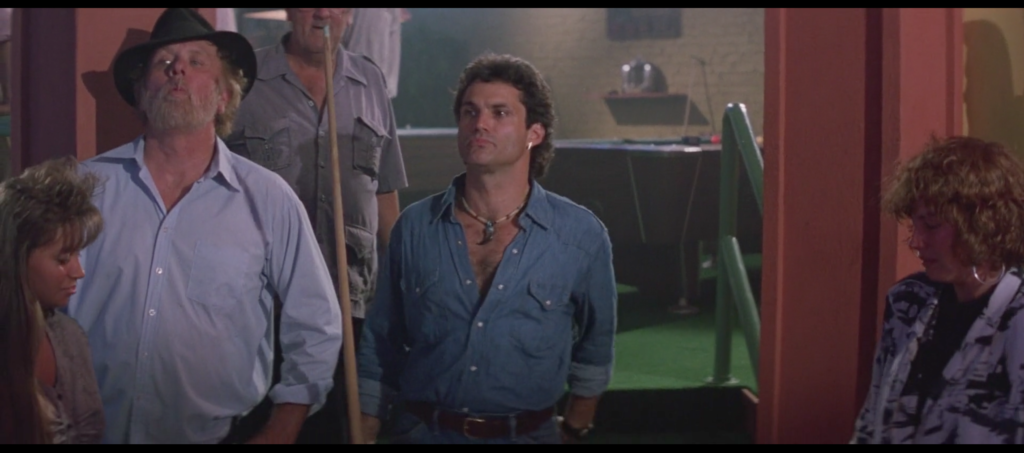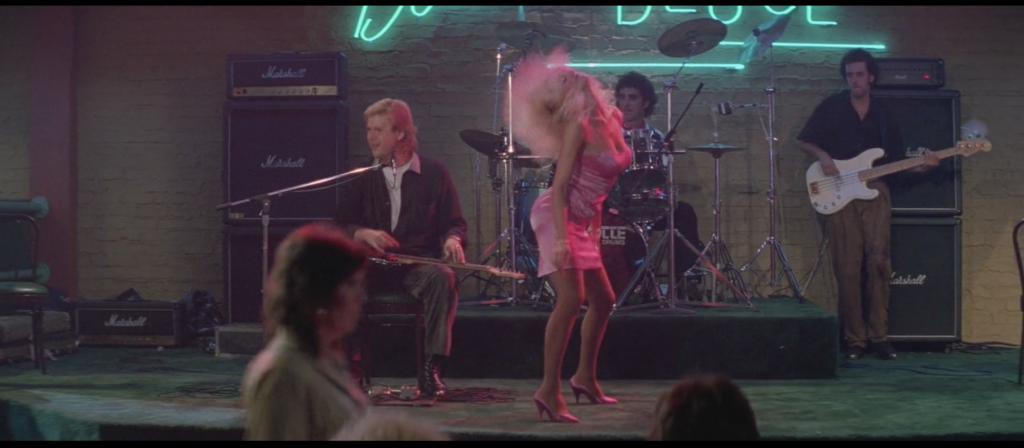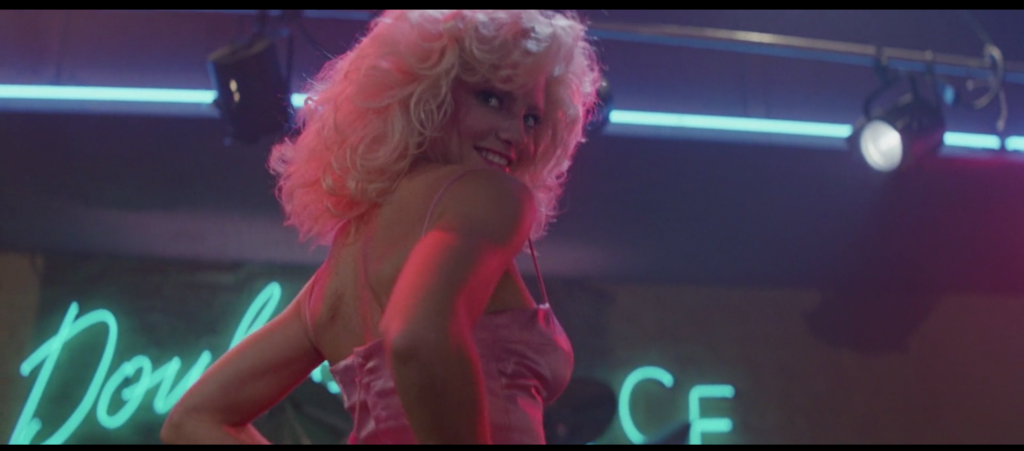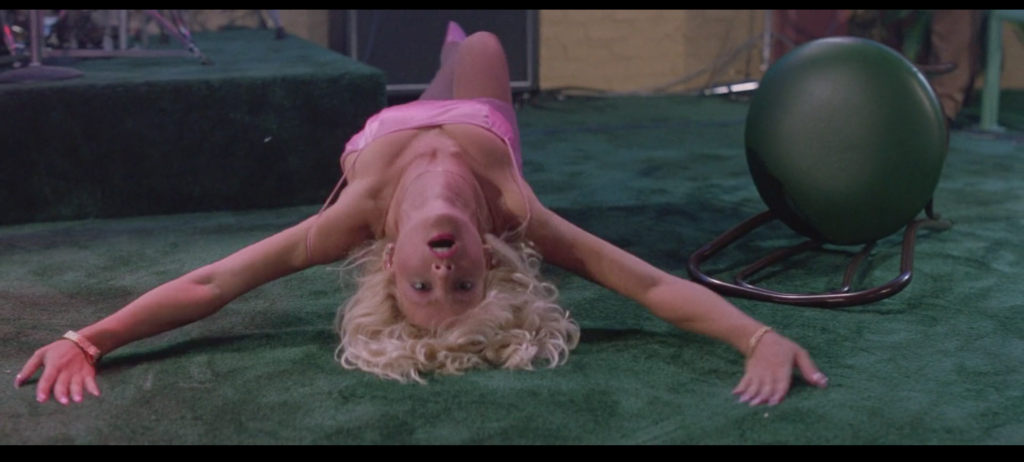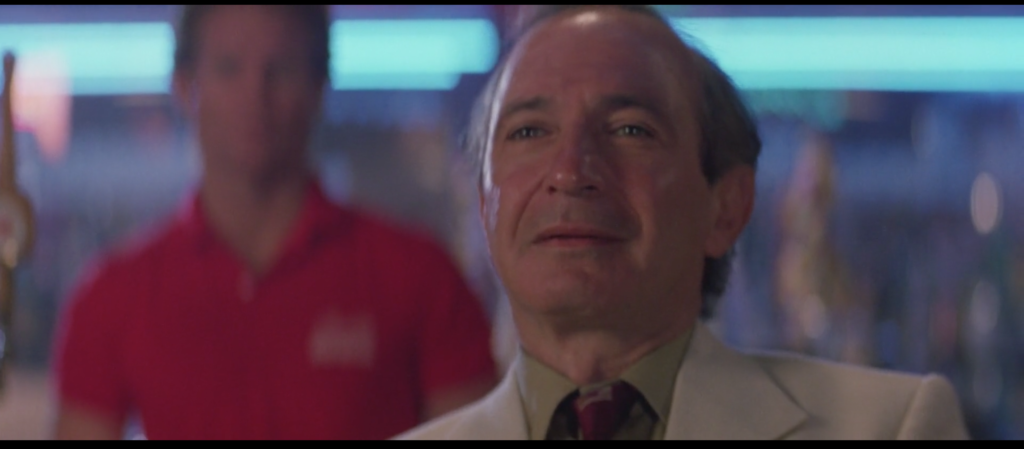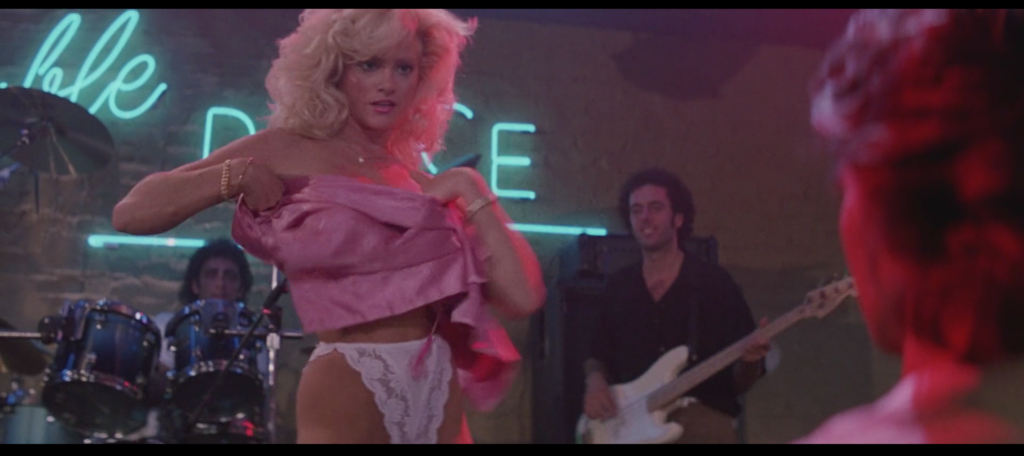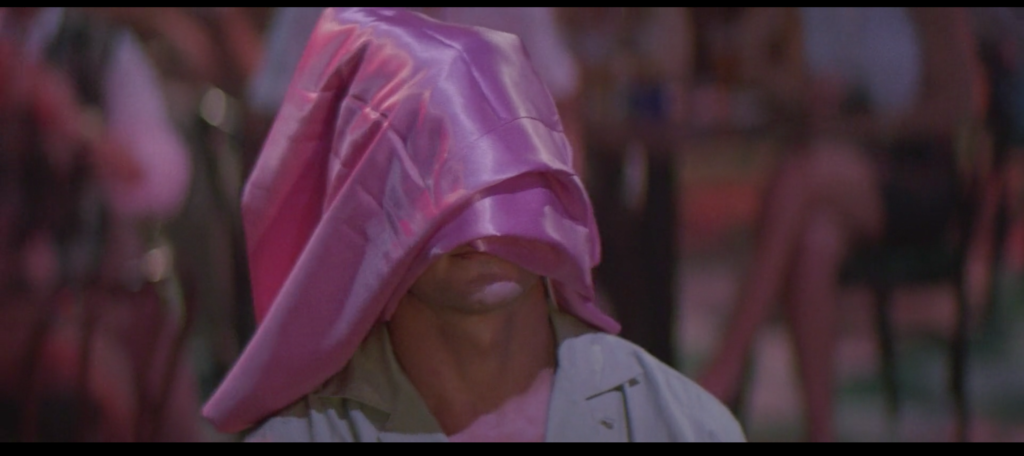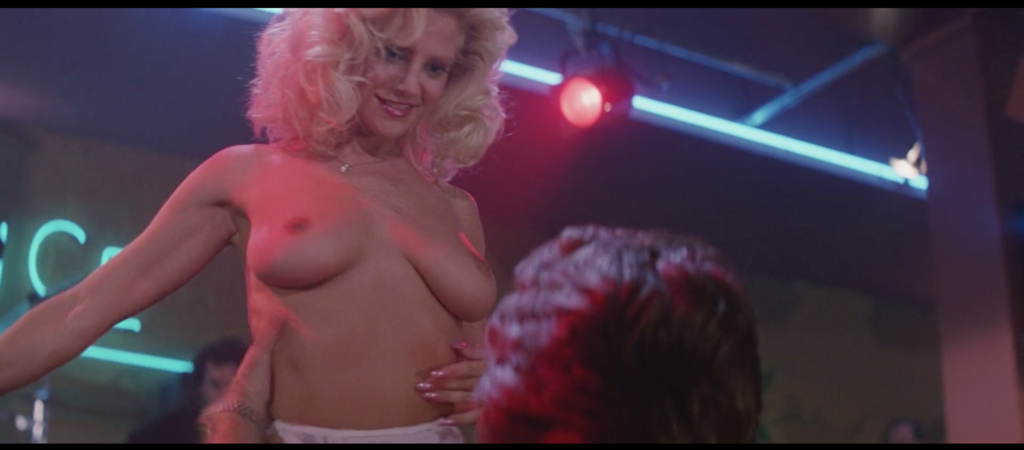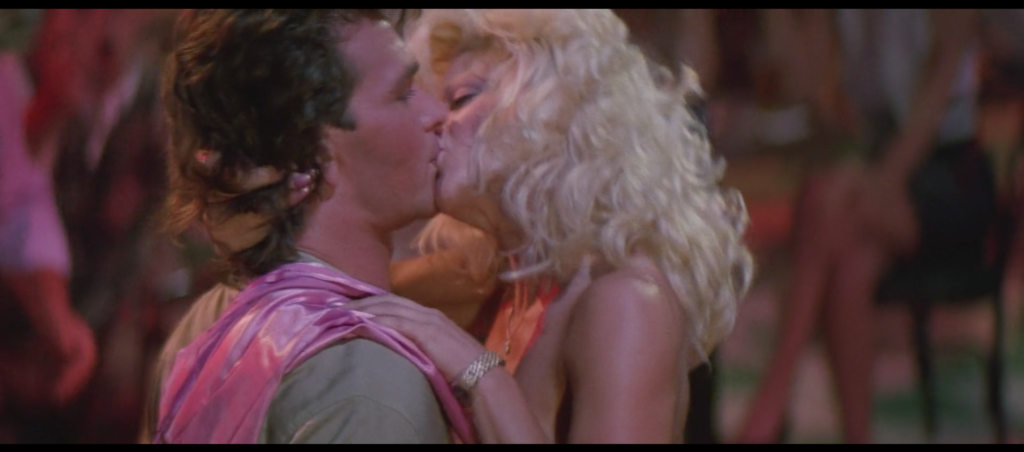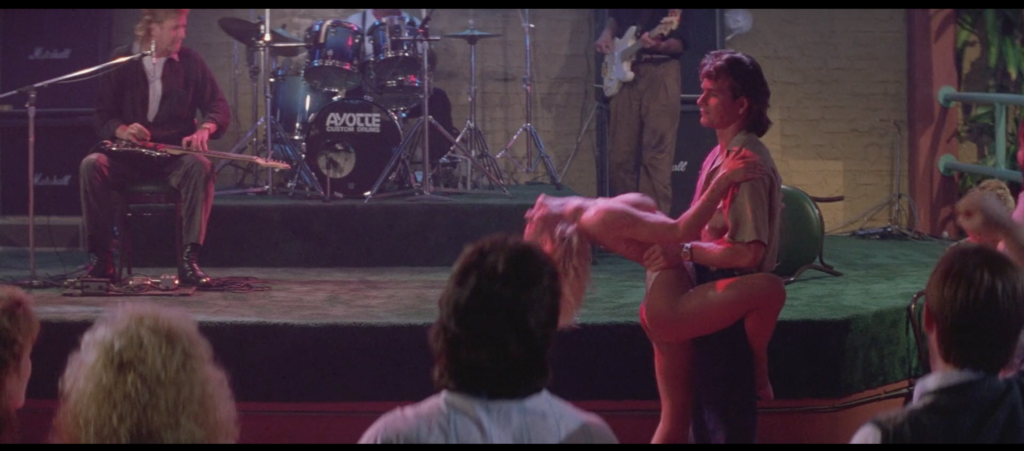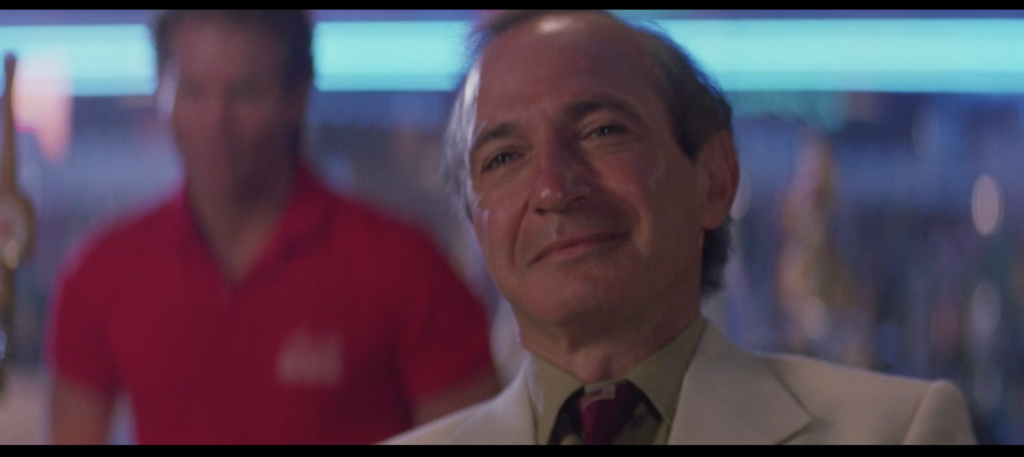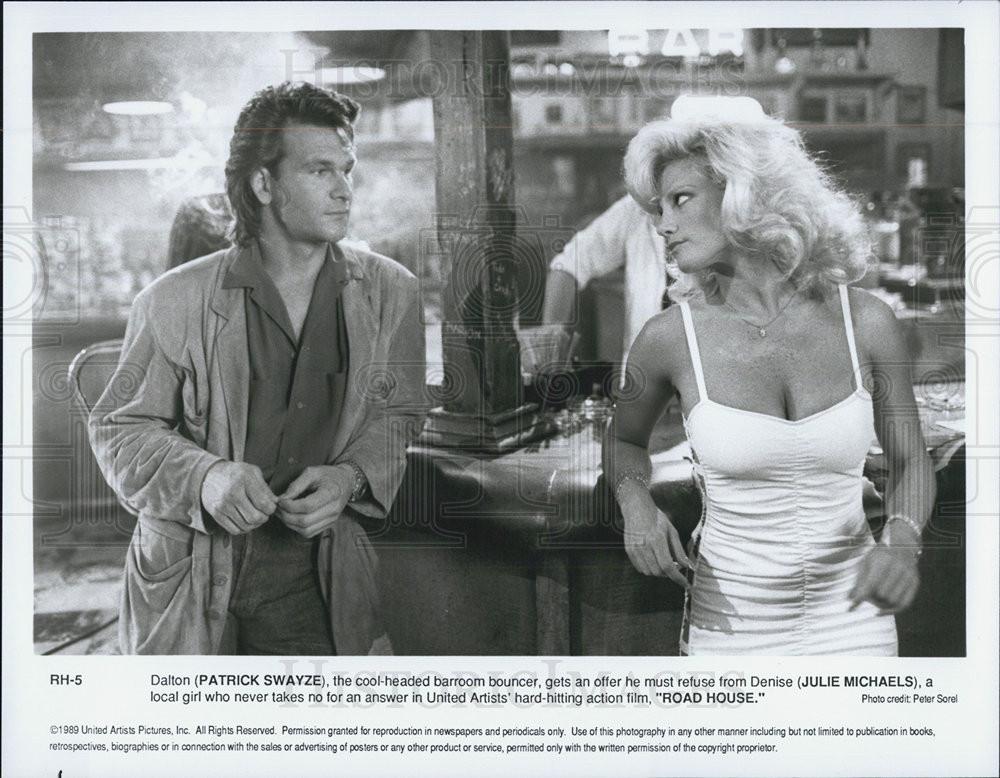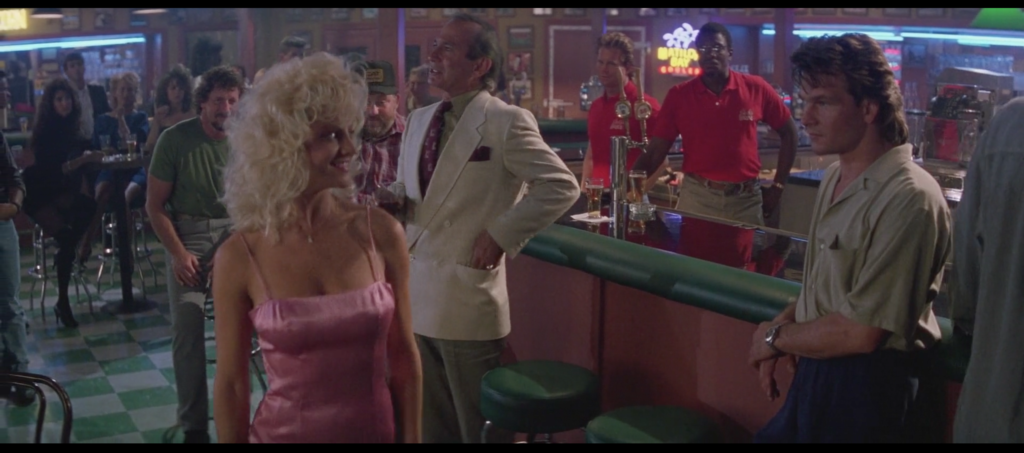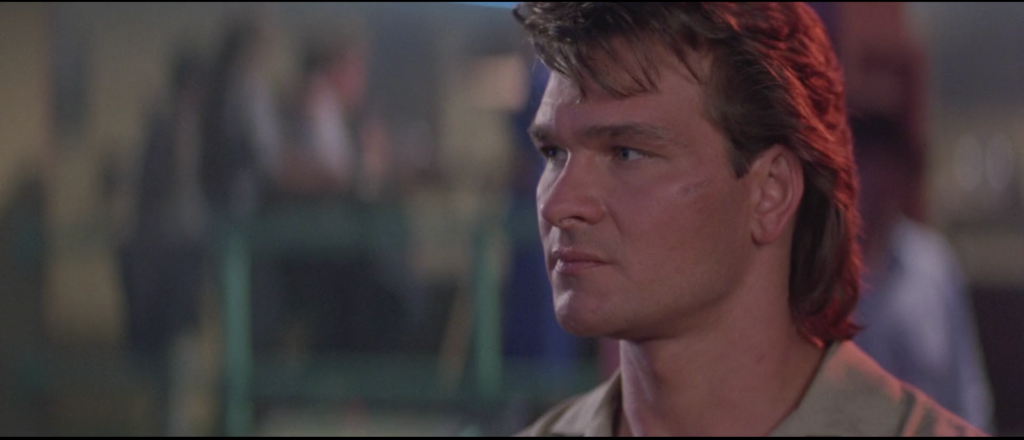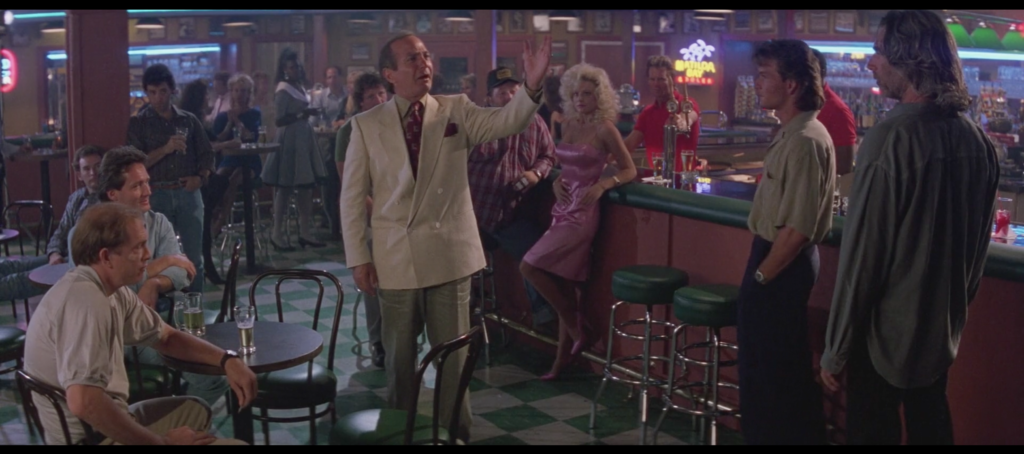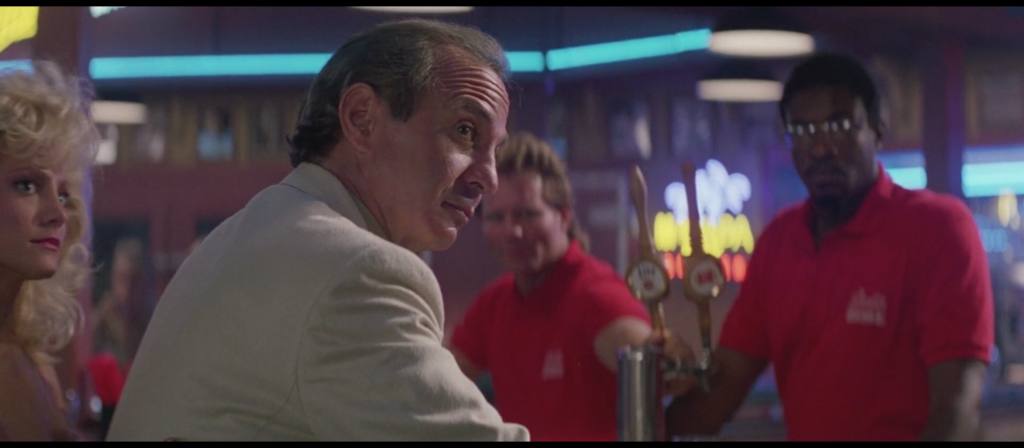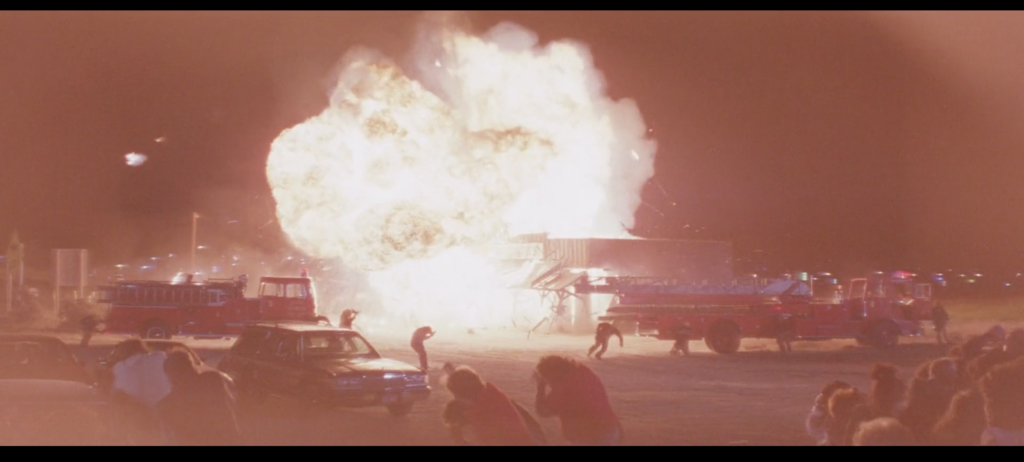Posts Tagged ‘dalton’
281. A hug is the shortest distance between two friends
October 8, 2019For all his erudition where matters of bouncing and cooling are concerned, there are some expressions of emotion that are beyond Dalton’s ability to articulate. His feelings toward Wade Garrett at this moment are such emotions. When Wade, who’s just told Dalton he loves him, bids him farewell, Dalton pauses just long enough for the older man to leave, then attacks his heavy bag with a vengeance, a flurry of kicks and strikes. You can see right away that the salvo is unsustainable, and that this man, who’s already worked himself up so much that even his teeth appear to be sweating, must needs relent in his attack. You figure a quick cut away from the action will be the film’s exit from this scenario.
But instead, Dalton reaches out, wraps his arms around the punching bag, and leans in, letting it partially support his weight. We all need someone we can lean on, but Dalton has allowed that someone to exit his life. He wants to beat the living shit out of him for it, but he also wants nothing more than to collapse into his understanding and embrace, let them buoy him, keep him from slipping under.
If you care about Dalton it’s a hard moment to watch. He’s wrong to feel alone—Wade still cares about him, and so does Doc, and so do the likes of Emmett and Red and, in his bizarre way, Frank Tilghman. But he does feel alone nonetheless. So he’s hugging a punching bag, in lieu of assaulting the bag or hugging a human being. It’s a poor substitute for either, but in this moment it’s all he has.
280. “I love you, mijo.”
October 7, 2019“No, we don’t wanna do this,” Wade Garrett says as he takes Dalton by the hand as only a fellow cooler can: by stopping the punch the younger man just aimed at his face. Toughness and tenderness in a single gesture.
But there’s more.
“I wanna tell you something else,” says the old man: “You taught me as much as I ever taught you.” The teacher has become the student. The Way of Wade Garrett, shaped by the Dalton Path as it shapes the Dalton Path. Applied Philosophy 101.
But there’s still more, and it means more than anything.
“I love you, mijo.”
At last, at long last, the subtext is text. More than a teacher, advisor, mentor, friend. Mijo means “son.” A father’s love, bestowed mere seconds after the son tried to kill the father. There is no love greater.
“I’ll see you.” Wade Garrett departs, leaving his mijo, his Dalton, to contemplate his words, and to succeed or fail in the quest he has chosen to take on. He is armed in Wade Garrett’s love, now.
We will soon see what happens when that love is taken away.
279. Wade Garrett goads Dalton into throwing a punch at him, which he intercepts, and really what more is there to say than this:
October 6, 2019278. “Leave me alone!”
October 5, 2019Wade Garret is calm. Cool. Collected. Most importantly, clothed. After the events of the past two days he’s ready to blow this popsicle stand (whether or not Brad Wesley brought the Good Humor Man to Jasper is unknown) and head on down the road. He wants his amigo, his mijo, to come with him. “You don’t need this,” he says, referring to Brad Wesley, to Jasper, to blown-up auto parts stores and run-over auto dealerships and aggressive stripteases.
“Don’t tell me what I need!” Dalton growls as he hits the heavy bag like a man possessed. “If you wanna go, go, get the fuck out of here and leave me alone!”
There’s a juvenile growl that creeps into his voice in that last phrase. The sound of a child desperately telling a bully to cut it out, a teenager yelling at his mom to get out of his room, Karen from GoodFellas reverting to girlhood and shouting “You don’t know how I feel!” at her mother when she complains about Henry Hill’s late-night gallivanting. Dalton, too, reverts to childhood around his mentor.
If Wade were thinking more clearly he’d know that this would happen, he’d know that telling Dalton what to do when he’s like this all but guarantees the opposite outcome. But I think it’s less naïveté that animates Wade’s words and more a grim premonition of the future should he and Dalton stick around. Horny Marines and drunken yokels they can handle. Brad Wesley and his goon army have proven themselves to be a whole new order of trouble. Faced with overwhelming firepower, the Way of Wade Garrett is to walk away, before it’s too late.
Alas.
277. Annihilation of the Shirt
October 4, 2019It’s all gone to shit, hasn’t it. It’s all gone to shit, and it goes ill with the king. Just two days prior Dalton was up all night with Wade and the Doc, drinking beers and showing off scars and looking at pubes and asses and generally having a grand old time. Then Brad Wesley, finally, took the results of the Breakfast Conference to heart. He blew up Red Webster’s store. He had Denise dance provocatively at the Double Deuce. He sicced Jimmy on Jack, Hank, Younger, and Wade. He ran over Strodenmire Ford with a monster truck. War was declared and battle came down.
Where does this leave Dalton? Not being nice, yes, that’s obvious. But in what way? How can he vent the fury he knows can be lethal if he’s not careful? By taking his fucking shirt off, that’s how. By taking his fucking shirt off and sweating so much it looks like someone applied a thin coat of vaseline and beating the living shit out of his homemade punching bag. Better that than the alternative—or is it?
Gone are the days when shirtlessness signaled calm, tranquility, peace with himself and his surroundings. He’s not getting out of bed bare-assed and having a smoke while his new friend brings him breakfast. He’s not performing tai chi on the shore as old men gaze in admiration. He’s not fresh from coitus with the doctor he loves. He is anger, he is rage, he is fire and life incarnate, he is the darkness within, and he is not wearing a fucking shirt. Not on this side of the Third Rule, no.
266. Head On Down to Wagon Days
September 23, 2019“Dalton, you gotta check this out,” Jack says. “Looks like Wesley wants to put a little something down on a new car.” This is his tipoff to his boss that Brad Wesley plans to take a monster truck and destroy a car dealership with it. Why he chose to deliver this information in a wisecrack is the viewer’s to decide. Spider-Man, I’m thinking—Jack reads Spider-Man comics, hence the resort to jokes during tense moments. Do I get a No-Prize?
But Jack and his banter and his weirdly small boots with his stonewashed denim tucked into them is beside the point. Mostly I want to call attention to the assemblage of humanity present for the impromptu monster truck rally. Jack is there, and so are his Double Deuce coworkers Carrie Ann and Frank Tilghman. Red Webster is there too—guess he didn’t skip town after all—along with Emmett, who has finally taken his place in the Council of Elders I suppose. Brad Wesley has brought along virtually his entire goon crew, though that’s to be expected when you’re planning to destroy a place of business in broad daylight.
And here in their car are Dr. Elizabeth Clay, Dalton, and Cody from the Jeff Healey Band. What was their plan for the afternoon? What did that conversation sound like? “Hey Cody, it’s Dalton. Look, me and the Doc were gonna swing by Wagon Days at Strodenmire Ford after lunch sometime. Wanna come with?” “Sure thing, man, just gotta drain the main vein first.” “Okay, well, as I said we won’t be heading over till like one or two, so you should have plenty of—hello? Hello?”
265. Fear itself
September 22, 2019Frank Tilghman is having scotch on the rocks at the “village worthies meet at Red Webster’s house as he packs up to move following the destruction of his place of business and the subsequent barfight instigated by the arsonist” function, as a totally normal innocent normal man could be expected to do. But he has more to offer than the jolly sound of ice tinkling in his glass. “You scared him last night,” he says to Dalton regarding Brad Wesley, who we’ve just learned from Red Webster has the police department in his pocket, hence the lack of official inquiries when people are beaten half to death in front of hundreds of other people. “Brad Wesley, he’s not afraid of anything, right?” he asks rhetorically. “Well, last night, that son of a bitch was afraid.”
“No he wasn’t,” Dalton retorts, smiling. Normal conversation with normal reactions all around.
Dalton is right, of course. Brad Wesley oozed confidence out of every pore in the Double Deuce the night before. He had his girlfriend or kept woman or whatever poor Denise is strip to prove his prowess. He then ordered his boy Jimmy to fight the bouncers and Wade Garrett for the same reason. Finally, he fired a gun to call the fight off, showing that the action starts and stops on his say-so. He really could not have been more empowered, and more sure of his empowerment, even before we get to the whole “getting away with arson” thing. Christ (as Wesley would say), he went to the Double Deuce for the express purpose of rubbing his role in the arson in everyone’s face!
So once again we must wonder, what’s Tilghman’s angle here? Why is he having a drink? Why is he smiling? Why is he touting a nonexistent weakness in Brad Wesley’s armor to the man he wants to attack that nonexistent weakness? Why would he instigate further hostilities given the tremendous cost incurred by everyone involved other than himself?
264. The Council of Elders
September 21, 2019The destruction of Red Webster’s Auto Parts by the coward Brad Wesley triggers alarm bells for the Jasper Chamber of Commerce, or whoever the assembled worthies in the scene that follows the morning after the bar fight are supposed to be. Red and Tilghman, sure, they’d be there. Dalton, why not, he’s obviously the focal point for Brad Wesley’s anger. Doc is Red’s niece, and as the ostensible purpose of the meeting is to persuade him not to pack up and run away from town it makes sense she’d be there. These other fellows? At this point it’s anybody’s guess. So let me be the first to assure you that you will never see the two gentlemen in the background ever again. Who are they? What do they think? Are they Fotomat and 7-Eleven franchisees who got into bed with Brad Wesley and are now feeling buyer’s remorse? Does maybe one of them own the boat store that forms the third point of the Double Deuce/Red’s Auto triangle? Why isn’t Emmett here? What about Big T of Big T Auto Sales, or the crusty guy who sells Dalton spare tires, or the crusty guy who runs one of the several greasy spoons Dalton visits, or anyone we’ve ever seen before? We will never know. Accept the mystery.
But the mustachioed fellow in the ill-fitting gray suit in the center? Ah, so you’ve met Pete Strodenmire. We are currently one hour and twenty-four minutes into the film, with half an hour to go; what better time to introduce a major new character—as well as the fourth and final Car Salesman of Jasper, Missouri—who will go on to participate in the killing of the film’s antagonist? He does little of equivalent efficacy here. He just asks Red if he has insurance and offers to contact a friend in the FBI in Springfield about the arson in order to work around Wesley’s control of the local constabulary. Red truly does not want to hear about either proposal. So in its way this film is setting up our next encounter with Pete just a few minutes hence, when he proves as unable to stop a monster truck from running over his car dealership as he is to talk Red off the ledge here.
One final note here: Can you guess which august personage here assembled wants to continue the fight?
Now why on earth would that be? We wonders, precious, we wonders.
263. “Same town, new story, huh, pal?”
September 20, 2019Wade Garrett may have taken a few too many shots to the head at this point, because I swear the thing he says to Dalton as Brad Wesley, Jimmy, and the rest of the gang saunter away makes no sense. “Same town, new story, huh, pal?” he asks, which…I’m sorry, what? Surely he means “New town, same story,” insofar as Dalton and Wade both talk non-stop about how they’ve seen it all before during their lives on the road. Unless he means that their fun time gallivanting with the Doc was one story and now this whole explosion/striptease/barfight scene is a different story entirely. And the beers Wade proposes at the end of this scene—are they a third story? Or would they be a continuation of the first story, the gallivanting-with-Doc story, given how integral beers were to that story? Or is it a continuation of the second story, the explosion/striptease/barfight story, since it takes place in the same location? Or did Sam Elliott flub this line and director Rowdy Herrington liked the sound of it so he kept it intact, like how in “Pass the Mic” Mike D rhymed “commercial” with “commercial” instead of “rehearsal” but it actually made the point he was making (“Everybody rapping like it’s a commercial / acting like life is a big commercial”) better if he delivered it incorrectly?
262. Parallels
September 19, 2019It’s not often that you encounter two shots of two diametrically opposed characters doing basically the same thing but in such different ways that you can understand everything there is to know about them both at a glance. It’s not often that you encounter a movie like Road House either, though. And here we have two future combatants in a life or death struggle, one arm pulled back, the other extended. The first is poised but serene, making a fist but with no intention to use it, shirtless, glistening, one with nature, wet with nature. The second is enraged, pointing at an enemy, singling him out, hungry for a kill, blocking out the blue light of the happy societal microcosm in which he is an interloper. Dalton and Jimmy, two sides of the same coin, the Batman and Joker of the JC Penney.
261. “Your ass is mine, boy”
September 18, 2019There’s a thin line between threat and come-on, and Road House spends its final reels dancing all over it. When Dalton steps in to stop Jimmy’s trouncing of Wade Garrett (and we love Wade, we love Wade Garrett, but this is a piss poor showing on the sensei’s part), he naturally makes a mortal enemy of his opposite number. Jimmy’s relationship with Dalton heretofore has been one of long, meaningful stares, without so much as a word exchanged. But the relationship has escalated, and a statement is called for. It’s almost an overture for the opera to follow, featuring all the major melodies: smug superiority, possessiveness, infantilization, a reference to Dalton’s ass. Jimmy and his biological father Brad Wesley (that’s my statement, no further questions) will return to these refrains over and over as the duel for Jasper heads toward its bloody conclusion. After much toil and tribulation, we will finally learn whose ass is whose.
258. “YOU!”
September 15, 2019Jimmy Reno wants Wade Garrett. (Yes, his last name is Reno, as mentioned by Patrick Swayze in interview clips and as listed all over actor Marshall Teague’s CV. Yes, this could mean he is an illegitimate child of Brad Wesley born in Nevada, and Reno is his bastard name. No, I will not be taking further questions at this time.) Boy, does he ever. Enough to pole vault over Jack’s prone body onto the stage, just to be better seen and heard by his quarry. Once Wade responds, Jimmy jumps right back down again. He wanted to make a show of this. He wanted to ensure that Wade Garrett could not back out of this confrontation without losing face. He wanted the entire Double Deuce to watch him prepare to end a legend.
And Wade Garrett knows it, that’s the real asskicker. He and Dalton are off their game tonight, perhaps because of the traumatic destruction of a nearby business that’s still burning as this fight takes place, in front of the man who ordered the arson. The whole Double Deuce team is off its game, perhaps, otherwise the numbers would have worked in Jack and Hank and Younger’s favor. Instead, they’ve been laid out all over the dance floor while Wade and Dalton tussle with lesser goons we’ve never seen before nor will ever see again.
(Yes, one of them is wearing a large black hat. Yes, so is a woman visible in the background. Yes, I continue to be perplexed by the presence of all those hats. Again, I will not be taking further questions at this time.)
This is the moment Jimmy chooses to call out Wade Garrett. He vaults onto the stage. He turns. He points with the force of a kung fu strike. He bellows a single word, a single syllable: “YOU!” And Wade Garrett knows the time to be tested has come.
255. Faces
September 12, 2019254. “If you’re gonna have a pet, keep it on a leash”
September 11, 2019If you’ve read all 253 Pain Don’t Hurt entries to date you’ll agree I’m no fan of Dalton’s response to Denise’s striptease. His condescension, if not outright cruelty, to a sex worker and abuse survivor is unconscionable given his philosophical mandate to be nice until it’s time to not be nice. Is this, is the removal of Denise from the stage and the presentation of Denise to her abuser, really such a time?
All I can say in Dalton’s defense is that this is a rare case of seeing the forest but neglecting the trees. The destruction of Red Webster’s Auto Parts marks a major escalation of hostilities in the war between Dalton and Brad Wesley. That would make this time to not be nice, barring any further considerations; Dalton fails to realize that Denise and her plight are such further considerations. Moreover, the aforementioned war has been waged entirely, on Wesley’s side, by third parties, namely his goons. Dalton correctly locates Denise’s dance in the context of Wesleyan aggression, however weird that aggression might be in this case; he treats her as he might treat a goon, albeit one against which he does not want to raise his hand, missing the obvious distinctions between Denise and the Tinkers and O’Connors of the world.
It should be noted here that at one point Dalton cracks a wry smile at Denise when she’s beaming at him from the stage, but while that smile might be seen to indicate warmth towards her, it’s not at all dissimilar from the grins he occasionally flashes at the likes of Ketcham or Pat McGurn when they start to get up in his business. To Dalton, a goon is a goon is a goon.
But if he is guilty of making this categorical error, he is by no means alone. “If you’re gonna have a pet,” he tells Wesley while gripping Denise roughly by the arm, “keep it on a leash.”
Denise yanks her arm away.
“You’re right,” Wesley says, conceding the point.
Then—as if summoning a pet—he calls this man’s name.
252. Bump and grind
September 9, 2019The images above are but a sampling of the striptease Denise performs for…who, exactly? The target is clearly Dalton, with whom she barely ever breaks eye contact, against whose lips she passionately presses her own while wrapping him in a sensual embrace. Knowing, as we do from the scene in which she propositioned him, that she is sexually attracted to Dalton raises the issue of whether or how much she is enjoying this performance for her own purposes and pleasure. Certainly when he rejects her at the end, referring to as a pet off her leash, the anger and hurt in her eyes is real, as we will see.
But the architect of the dance is Brad Wesley, her boyfriend and abuser. After destroying Red Webster’s business with fire, he attempts to undermine Frank Tilghman’s Double Deuce in a far less violent fashion, at first anyway: He turns it into a strip joint, with his woman as the star attraction. I’ve watched this movie more times than I can count and I’m still not sure exactly what his game is here. He knows Denise is attracted to Dalton, as he either beat her or directed others to beat her for him for the crime of coming on to the cooler. Whom is he trying to tempt with forbidden fruit here, her or him? Or is this his malign way of providing her with an outlet for her feelings? Does he want Dalton to give in? What exactly would that entail—simply allowing the performance to continue without interference, or an actual sexual liaison after the dance is over? Is he trying to drive a wedge between the cooler and his bouncers, figuring they will either see his authority eroded if he stops the dance or chafe at his enforcement of the rules insofar as they impede their view of this beautiful woman? Has Wesley thought this through at all, or is he just winging it?
And what of the dance itself? Denise’s gyrations are wild, nearly arhythmic. She swivels her hips and head from side to side like a woman possessed. She rolls on the ground and nearly spider-walks her way back up again. Only when she begins to undress do her movements come to resemble the tease-to-the-beat we expect of a stripper, perhaps because she is focused on using her arms, her dress, and an onlooker’s hat to alternately conceal and reveal her breasts. At that point the dance becomes smooth, traditionally sexy, seamless, like Dalton and Dr. Elizabeth Clay’s equally unusual lovemaking from earlier in the film. At that point Denise feels in control of her body, rather than the other way around. But in control some of the earlier wildness is lost. Is this the kind of tradeoff she’s used to making, when it’s just she and Wesley, with no one else around to watch, no one to help her off the stage he’s put her on?
249. “Of course you can dance, honey”
September 6, 2019And you thought the dynamic between Dalton, Doc, and Wade Garrett was odd. Fresh from homophobically insulting Red Webster, defending his protection racket as an act of civic pride, and offering to buy the fire department a round (“Well, with a fire like that, nothing they could do,” he reasons), Brad Wesley drops a non sequitur on the assembled staff and patrons of the Double Deuce: “Of course you can dance, honey,” he croaks.
The thing is? No one has asked him if they can dance. So unless there was some inaudible exchange, unless Denise can speak at a pitch too high or too low for non–Brad Wesley humans to hear, this isn’t acquiescence to an existing request. This is an order. It may be couched in courtesy, but it’s still a command.
Based on what we’ve seen of Wesley and Denise’s relationship, she’s probably used to being ordered around. She certainly knows what will happen if she disobeys. But look at her face as she glides past Dalton on her way to the stage, for what will be a show-stopping striptease. She’s beaming. She’s staring right at Dalton and she’s hitting him with a smile bright enough to cast shadows.
As well she might. We know she’s attracted to Dalton. We know that she caught a beating for acting on that attraction, unsuccessful though she may have been. We know that the likelihood of her being free to come on to Dalton again is nil. But here’s her chance to shake her moneymaker for Dalton’s enjoyment—not just under Brad Wesley’s nose, but at Brad Wesley’s behest.
He may think having Denise dance is a masculine power trip, a way to lord his potency over his enemy while simultaneously threatening the rules and order by which the Double Deuce runs. She may be getting something else out of it entirely. Perhaps that’s the best way to understand what is about to occur—and perhaps it’s the most damning thing about how Dalton responds.
245. The go-ahead
September 2, 2019Brad Wesley has the people of Jasper, Missouri so shook that bartenders ask for permission before serving him, as if the act of pouring a shot for Brad Wesley is like letting a highly inebriated man pull a knife on you for trying to stop his girlfriend from dancing on a table. The bartenders, Ernie and Nameless, look straight to Dalton when Wesley makes his request, and fulfill it when and only when Dalton gives them an affirmative head-nod signal. Suddenly even the bartenders are acting like bouncers on the Dalton Path. Recall that it’s not their job to know when it’s time to not be nice; they won’t know, Dalton will tell them. As there are still a few grains left in the hourglass at this particular moment, Wesley gets his drink.
Given what is about to unfold one wonders if Dalton should have 86’d him right then and there. The numbers game appears—and I stress appears, because Wesley is holding several aces up his sleeve, along with a Jimmy-shaped Joker—to be even, which is to say it works in Dalton’s favor. Assuming Wesley to be a non-combatant, arrayed against Dalton, Wade, Jack, Hank, and Younger we can see Morgan, O’Connor, Tinker, and Ketcham, all of whom have fallen in Double Deuce–based combat already, in O’Connor’s case twice. (Maybe Wesley was right about him being a weak bleeder after all.) And since the bar is largely empty, with most of the crowd still outside watching the fire, the risk to civilians in the event of a brawl would be minimal.
But Dalton is reluctant to start something unless and until his opponent displays violent intent. As we will see, Wesley’s initial gambit is disruption rather than destruction—still a bounceable event, but not yet grounds for expulsion. I’ve never said this once during the course of this project but I’ll by-god quote it now: Man’s gotta have a code.
244. Infiltration
September 1, 2019The fox is in the henhouse. The rats are in the cellar. The weasels are in the corn. Using the conveniently timed explosion of Red Webster’s Auto Parts as cover, a large party led by Mr. Brad Wesley has infiltrated the Double Deuce. They expect the same things everyone does when they go to the bar: some drinks, some dancing, a little idle chatter. But they are arsonists and hired thugs, so naturally they’re not the sort of people who’d be allowed in the bar. Indeed, Morgan, Tinker, O’Connor, and Ketchum have all been expelled from the Double Deuce, bodily so in most cases. Only by distracting Dalton, Wade Garrett, and all the bouncers with the fireball outside could they even get in.
The presence of Wesley and his cronies is all but an admission of guilt, but it’s more than that. It’s a sign that Dalton’s control is slipping. He couldn’t stop these goons from getting in. As we’ll soon see, he doesn’t succeed in getting them out, either. Brad Wesley is calling, ordering, and firing the shots here, in that order.
The time to not be nice is here.
241. Fire fighter
August 29, 2019When Dalton discovers that Red Webster’s auto parts store is on fire he runs toward the burning building full-tilt. Never mind the fire trucks already pulling up to battle the flames. Never mind that it’s after hours and no one’s in the place to be rescued. Never mind that the place is set to blow at any moment. Dalton, who has never encountered a problem he couldn’t punch, looks for all the world like he’s running over there to physically beat up the fire. Fortunately or unfortunately the building explodes, sending gouts of flame a hundred feet into the air, before he can get too close, and the efficacy of this plan or instinct or whatever it is never gets put to the test. I wouldn’t have laid odds on the fire winning, though. Not in this movie.
There are a handful of moments scattered throughout Road House, like gems in Smaug’s treasure hoard, that illustrate who Dalton is. “Be nice” is one. “Pain don’t hurt” is one. The throat rip is one. The tai chi scene is one. And this is one. It has no pop-culture purchase whatsoever compared to the others; indeed I don’t know many people who’ve watched the movie who even notice it. But to me, it says so much about this man—a man of action, a man of dynamism, a man who wants to punch the fire.


